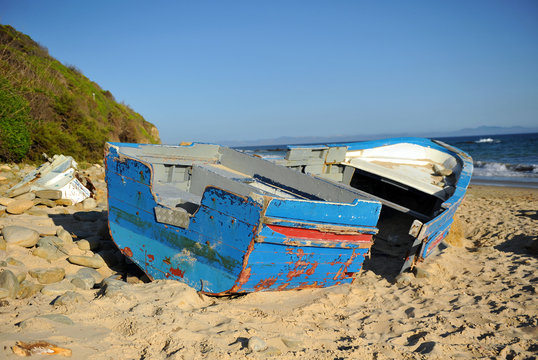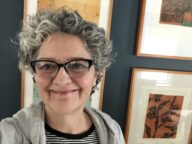Translated from the Spanish by Carmela Ferradáns
What I am about to tell you happened in real life. The daily press reported on it at the time, and I was able to talk with the protagonists, first at the hospital and later at the police station.
It was my first job as a reporter. I have to confess that I had two more courses to finish my journalism degree, but when I sent my job application to the newspaper, the requirement was to work for free so they didn’t bother to check my credentials.
“I live in the Strait of Gibraltar where three countries split up the bounties of the border: Great Britain, Morocco, and Spain. That’s at the political and military level because, at the economic level, only the drug and the human trafficking mafias run the show here.”
This is how I started my report. Manuel, my unemployed economist boyfriend, always told me that this path would not get me anywhere. “How can you say that drugs and human trafficking mafias are in charge here? You will not get anywhere with that line of reporting; besides, you have to prove it.”
I haven’t been able to finish my journalism degree. I never passed those two infamous courses, and this failure originated the following events.
Abdellatif Abraham Al-Haddad had come to Spain in a patera. He never denied it; he was like many others, “illegal” in today’s slang, a “wetback.” He never cared that people called him Pepe since his name was unpronounceable to the nurses. When I found him in a room at the Red Cross Hospital, he was suffering from terrible headaches, his eyes were blindfolded, and he had an expression of unbearable weariness written on his mouth.

A Patera
While I was going up the stairs, a slight trembling— or was it fear?— was running all over my body. I knocked at the door very gently: when he saw me coming in, his hospital roommate indicated with some irony that he didn’t speak, that only when he was asleep would he shout an unintelligible word in Arabic. “I am a journalist,” I said. “He will tell me everything. I speak French.” The roommate, in complete calmness, left the room. I noticed that he had a cell phone.
It was going to be my great report. I was going to show the world the tragedy that was unfolding around the Strait of Gibraltar with first-hand facts. Of course, I had to be careful, but at last, thanks to what I was about to tell, justice would be served. Democracy, our politicians— how can they be complicit with this situation? I would first seek justice in this world and finish my journalism degree later.
I thought a cornered man, sick, and in a hostile environment would surrender easily. However, neither my daily visits at the same time for weeks, nor the almond cakes like those from Morocco, nor the touch of my hand, nor my unconditional tenderness worked as I expected. Abdellatif was not talking.
After a month, that afternoon, when I opened the door in silence, I realized that something had changed. I peeked into the room: his back towards me, nervous, without the blindfold. He turned around slowly and showed me his tragedy: he had only one eye left. His gaze hard, sad, worn, without a trace of tenderness, recognized me. Greeting me with his typical expression of weariness, he said: “Sa’ra’.” With honest candor, without any trickery, I imagined that he was calling me by my name. “No, Abdellatif, remember, my name is Luz.” He didn’t say anything for the rest of that afternoon nor in the days that followed.
Time passed and I had not begun my report. In reading the daily press, I was verifying data about the dead in the Strait, about the “illegals” who returned to Morocco; there was always some data in the news coming from the press. I was aware that I was facing an important journalistic research task: I knew the pieces in this game of chess, but I felt that I was unable to see the whole game, to make the right move. The flat silence of Abdellatif, his ill-fated atrophy, had paralyzed my enthusiasm. I sensed a trap.
I went back up the stairs. This time his room felt like it was on a higher floor, or perhaps it was my fatigue. I opened the door again, in silence. An ironic smile welcomed me; I felt he was waiting for me. “They released him, and me too”— I never knew what his ailment was. “I am glad,” I said. “Where is Abdellatif?” “You are the journalist; look for him,” he answered with a hostile attitude. He was still carrying his cell phone.
It was like looking for a needle in a haystack. At the Algeciras Police Station, crowded with Moroccans waiting for their forced repatriation, everyone was invisible.
At the corner of the counter, a policeman without a uniform caught my attention. Lacking enthusiasm, stealthy and perhaps too close to his face, I whispered: “I am looking for Abdellatif Abraham Al-Haddad.” He looked at me from the corner of his eye in a sardonic way. “How come? Are you a relative of his?” He lost me right there. “No. Well, yes.” He answered back very close to my face. I grazed his breath and heard what I didn’t want to hear: “Look, gorgeous, if you like black men, you have to pay for it.”
That Sunday afternoon was draining my time away while a sticky sweat was in control of my thoughts: tomorrow will be Monday, and that was my deadline. “This would have been a good report,” the director told me, “but without concrete data, it is impossible to prove anything, much less to publish it.”
“There is something, something important here: why was he calling me Sarah?” I said, flustered. “Come on, move on!” he answered without emotion, patting me on the back.
That Sunday night was useless in my life. I woke up on Monday, defeated, my eyes inhabited by a puffiness worthy of the best hangover, assaulted by the memory of nightmares where Jahveh shouted to Abraham something about his wife, Sarah, over the burning bushes. I needed several hours to erase the anguish from my mind.
***
Luz’s report was published. The hospital roommate had talked with the newspaper director before he gave his approval. “Indeed, the Civil Guard had to throw smoke cans at the people arriving in pateras amidst the jara— you know, they hide in the bushes— but there was no one injured, except for one who was left without an eye; everyone was returned to Morocco safe and sound, as always, you know? As always. By the way, the lady reporter, was she really a journalist?
Notes:
Jara (pronounced sa’ra’): bushes alongside Río de la Jara, in Playa de Los Lances, Tarifa. It is also a pointed stick, hardened by fire that is used as a throwing weapon. In everyday jargon, a nightstick, a police baton, and by association, a police officer.
Pateras: in everyday jargon a broad, shallow, rickety boat used by migrants to cross the Straits of Gibraltar. In ancient material culture, broad and shallow plates used around the Mediterranean for libations.
Also, read a short story by the stalwart Bengali writer, Manik Bandopadhyay, translated to English by Nishi Pulugurtha, published in The Antonym
Follow The Antonym’s Facebook page and Instagram account for more content and interesting updates.
For the month of September, The Antonym will be celebrating Translation Month to mark International Translation Day celebrated on 30th September. A number of competitions, giveaways, podcasts, and more have been lined up for the occasion. Please join The Antonym Global Translators’ Community for updates!



























0 Comments